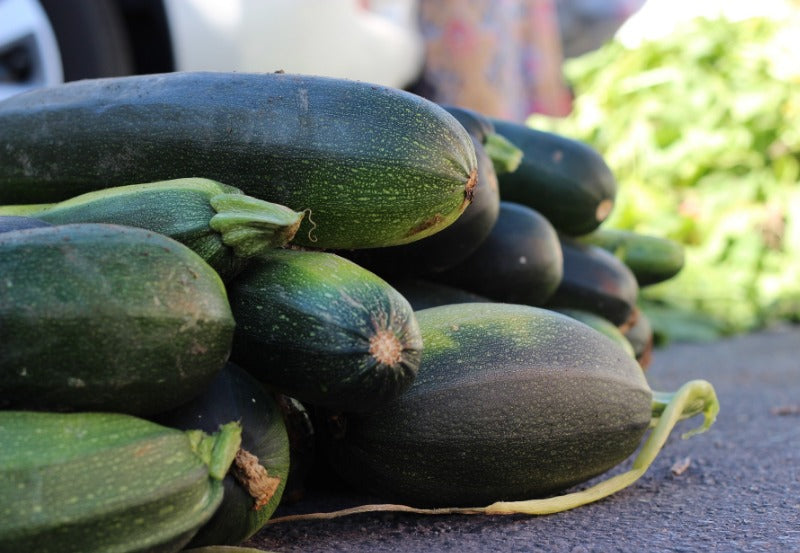This versatile veggie might be great for breads, casseroles, and stir-fries, but it might not be so great for your bearded dragon’s salads! Before you serve up this popular food, let’s see if it’s safe for your pet to eat. Can bearded dragons eat zucchini?
The short answer is yes, bearded dragons can eat zucchini, but definitely not every day.
Why Can’t Bearded Dragons Eat Zucchini All the Time?
Zucchini is delicious and quite healthy for humans, and offers some key nutrients to bearded dragons. However, zucchini ultimately falls short for beardies because of two issues relating to calcium.
Low calcium. Zucchini is quite low in calcium, with just 16mg per 100g serving. Calcium is extremely important for bearded dragons; they need it for strong bones but also in order to be overall healthy and thriving. Since bearded dragons typically get more of their calcium from plants than insects, the vegetables they eat on a regular basis should be a significant source of calcium. Since zucchini isn’t, that is one reason not to fill your dragon’s bowl with it on a daily basis.
Poor calcium to phosphorus ratio. There is a lot more phosphorus than calcium in zucchini. In fact, the ratio is 1:4.4 with phosphorus being predominant, which puts zucchini way out of the recommended range for regular consumption (1:1 to 2:1, calcium to phosphorus). Some Dragon Keepers do not let their bearded dragons eat any zucchini because of this, and understandably so.
Pro Tip: If your bearded dragon has any underlying health conditions, speak with your vet before including zucchini (or any new vegetable) in her diet.
Risk of metabolic bone disease. Since zucchini isn’t dense in calcium and has quite a bit of phosphorus, it can cause health issues if bearded dragons eat too much of it. Phosphorus binds with calcium in the body and prevents it from being absorbed in the bloodstream. Too much phosphorus over time will begin depleting the dragon’s own supply of calcium, which can result in metabolic bone disease.
This condition causes shrunken bones and misshapen bodies, and in severe cases paralysis and death. Sadly, it’s one of the most common health problems that pet beardies suffer from, but it’s preventable with good diet choices and proper calcium supplementation.

Only offer zucchini once a month or less often to reduce the risk of metabolic bone disease. And know that a little zucchini now and then does offer your dragon the following vitamins, minerals, and nutrients:
- Antioxidants, which prevent inflammation
- Vitamins A and C, which are key for growth, a healthy immune system, vision, reproduction, and organ and tissue maintenance and repair
- Vitamin K, which regulates blood clotting and aids in bone and overall health
- Vitamin B6 and folate, which boost energy and help maintain the nervous system
- Fiber, which supports a smooth digestive flow
- Thiamine, which helps maintain nervous tissue health
- Manganese, which aids metabolism
- Magnesium, which promotes brain and muscle health
- Potassium, which regulates blood pressure and nerve function
So it’s not all bad...just very bad for regular consumption.
How Do Bearded Dragons Eat Zucchini?
Bearded dragons can eat raw zucchini. Although you can serve them cooked food, bearded dragons really do not need to eat cooked zucchini, since cooking does deplete the already relatively low nutritional value. Plus, out in the wild bearded dragons would be eating raw vegetation anyway, so they are used to it. Follow these easy steps so your bearded dragon can easily eat the zucchini you serve:
- Wash the zucchini thoroughly, then remove the peel. Bearded dragons can very easily choke on zucchini’s waxy peel, and if it becomes stuck in their throat it can be quite difficult to remove.
- Shred the zucchini finely with a cheese grater or chop it into very small pieces.
- Feed it alone or mixed in a salad with your beardie’s favorite veggies and greens.
Pro Tip: Pair zucchini with calcium-rich staple greens such as alfalfa or turnip greens, and nutritious veggies like acorn squash and bell pepper.
In the event that your bearded dragon does get a bit of peel or even pieces of salad lodged in his throat, you can try to coax him to drink some water from a syringe to wash it down. If that doesn’t work, you can try using a soft spoon or spatula to gently open your dragon’s mouth with one hand and use your free hand to pull out the food with your fingers or tweezers.
If you use tweezers, be extremely cautious not to poke your bearded dragon’s throat. If you use your fingers, be careful to avoid being bitten.
In the end, you’ve got the yellow light to give zucchini to your bearded dragon...it can be safe, if you proceed with caution...but you may just want to sit this one out! In the end it's up to you to decide what's best for your beardie.
If you have questions or would like to give feedback, please email us at team@dragonsdiet.com








